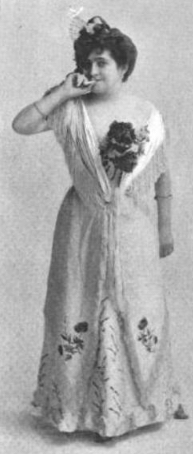Rosa Olitzka
Rosa Olitzka (September 6, 1873 – September 29, 1949) was a German-born contralto singer. She sang with the Metropolitan Opera from 1895 to 1901, and with the Chicago Opera from 1910 to 1911.
Early life[edit]
Rosa Olitzka was born in Berlin; her parents were Jewish immigrants[1] from Poland.[2] Her father, Joseph Olitzki, was a cantor.[3][4] She studied voice with Julius Hey in Berlin, and with Désirée Artôt de Padilla in Paris.[5] She also studied piano.[6]
Career[edit]
Olitzka made her opera debut in 1892, in Brno. She sang at the Court Theatre in Hanover, at the Municipal Theatre in Hamburg, and at the Court Opera in Dresden. At the Royal Opera House in London's Covent Garden, she appeared in Siegfried (1893), Orfeo ed Eurydice (1894), Otello (1895), Lohengrin (1895 and 1907), Faust (1895), Tannhäuser (1895), Die Walküre (1895, 1900, and 1907), Carmen (1897), Götterdämmerung (1900), Rigoletto (1901), and Aida (1905).[7][8]
Olitzka sang at the 1896 funeral of William Steinway, in New York City.[9] She first performed opera in the United States with the Damrosch Opera Company, and was a member of the Metropolitan Opera from 1895 to 1901. From 1902 to 1910, she was in Europe, singing in various German cities, as well as Brussels, Paris, and in Milan, at La Scala. She sang with the Chicago Opera from 1910 to 1911. Her Chicago manager was Vera Brady Shipman.[10][11] In 1915 she toured Kansas, Arkansas, and Texas, giving concerts.[12][13] She made dozens of recordings, mostly on the Columbia label, including several duets with soprano Bernice de Pasquali.[14][15] "Mme. Olitzka has a marvelously sweet yet strong voice and produces wondrously beautiful tones in her work," commented one reviewer. "Dramatic in manner as she sings, her vocal efforts are most charming. Her voice is perfect in a compass of three full octaves from low C to high C."[16]
She had a famous collection of jewelry, including a diamond pin given to her by Queen Victoria for her work, and a medal from Kaiser Wilhelm.[17] She was the victim of several publicized episodes of theft or robbery later in life, in 1920,[18] 1930,[19] and 1937.[20]
Personal life[edit]
Rosa Olitzka married Boris J. Sinai, a Russian-born insurance agent, in 1908.[3] She was widowed when he died in 1919. She died from a heart attack in 1949, aged 76 years, in her Chicago home.[21][22][23]
References[edit]
- ^ "Rosa Olitzka, Contralto". Newton Kansan. 8 April 1915. p. 4. Retrieved 8 August 2019 – via Newspapers.com.
- ^ Krzywicki, Paul (16 March 2016). From Paderewski to Penderecki: The Polish Musician in Philadelphia. ISBN 9781483442679.
- ^ a b "Untitled news item". The American Israelite. 2 April 1908. p. P6. Retrieved 8 August 2019 – via Newspapers.com.
- ^ Baltzell, Winton James (1914). Baltzell's Dictionary of Musicians: Containing Concise Biographical Sketches of Musicians of the Past and Present : with the Pronunciation of Foreign Names [and] with a Supplement of Over Two Hundred Names. Oliver Ditson Company.
- ^ Arakelyan, Ashot (25 October 2014). "Rosa Olitzka (Mezzo-Soprano) (Berlin 1873 - Chicago 1949)". Forgotten Opera Singers. Retrieved 7 August 2019.
- ^ "Rosa Olitzka". Musical Courier. 31: 108. 12 December 1895.
- ^ Wearing, J. P. (21 November 2013). The London Stage 1890-1899: A Calendar of Productions, Performers, and Personnel. Scarecrow Press. pp. 208, 269–270, 357–358. ISBN 9780810892828.
- ^ Wearing, J. P. (5 December 2013). The London Stage 1900-1909: A Calendar of Productions, Performers, and Personnel. Scarecrow Press. pp. 22, 57, 245, 327. ISBN 9780810892941.
- ^ "William Steinway's funeral | The William Steinway Diary: 1861-1896". Smithsonian Institution. Retrieved 8 August 2019.
- ^ "Rosa Olitzka". Music News. 13 April 1917. p. 19. Retrieved 8 August 2019.
- ^ R. H. (18 May 1917). "A Social Musicale". Music News. p. 9. Retrieved 8 August 2019.
- ^ "Mme. Olitzka Completes Tour". Musical America. 22: 38. 12 June 1915.
- ^ "Mme. Olitzka Made a Hit". The Daily Gazette. 26 January 1915. p. 4. Retrieved 8 August 2019 – via Newspapers.com.
- ^ "Olitzka, Rosa". cantabile-subito. Retrieved 8 August 2019.
- ^ "Rosa Olitzka (vocalist : contralto)". Discography of American Historical Recordings. Retrieved 8 August 2019.
- ^ "Mme. Olitzka Sings to Appreciative Audience". Asbury Park Press. 23 August 1910. p. 8. Retrieved 8 August 2019 – via Newspapers.com.
- ^ "Ysaye Recital Brilliant Affair". The Charlotte Observer. 1 January 1913. p. 6. Retrieved 8 August 2019 – via Newspapers.com.
- ^ "Singer in Court". The Evening Sun. 7 January 1920. p. 2. Retrieved 8 August 2019 – via Newspapers.com.
- ^ "Chicago Woman Robbed of $8,000 in Jewels". The Tribune. 31 July 1930. p. 6. Retrieved 8 August 2019 – via Newspapers.com.
- ^ "Burglar Gets Pin Princess Gave to Singer". Chicago Tribune. 22 January 1937. p. 31. Retrieved 8 August 2019 – via Newspapers.com.
- ^ Forbes, Elizabeth (2002). "Olitzka, Rosa". Olitzka, Rosa. doi:10.1093/gmo/9781561592630.article.O007931. ISBN 978-1-56159-263-0.
- ^ "Rosa Olitzka, 76, Once with Opera". The New York Times. 1 October 1949. p. 13 – via ProQuest.
- ^ "Mme. Olitzka, Ex-Opera Star, Dies in Home". Chicago Tribune. 30 September 1949. p. 22. Retrieved 8 August 2019 – via Newspapers.com.
External links[edit]
- Rosa Olitzka at Find a Grave
- Rosa Olitzka in the Met Opera Archives.
- Three photographs of Rosa Olitzka in the Philip Hale Photograph Collection, Boston Public Library.
- Sheet music featuring a photograph of Rosa Olitzka, from the New York Public Library.

